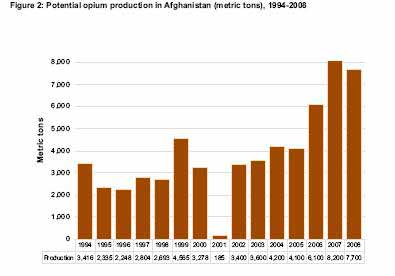We keep hearing from the drug warriors that the war is going great, with disasters like Colombia, Mexico, and Afghanistan held up as examples of success. Isn’t there some kind of psychiatric term for a complete disconnect from reality?
Danny K has an excellent post over at Transform: Afghan Opium and the Emperor‰s New Clothes about a presentation he attended featuring Antonio Maria Costa Executive Director UNODC and Bill Rammell, Minister of State Foreign and Commonwealth Office (UK).
Their headline was the 20% reduction in opium cultivation which they welcomed (albeit cautiously) as evidence of new found success of their respective interventions in the region. Opium production, by the way is only down 6% (as yields per acre cultivated have risen).
The statistical annex on world drug prices and purity from the World Drug Report 2008, shows precisely how badly they are really doing – even by their own standards. It is now eight years after the Allied troops overthrew the Taleban and effectively took control of the country with one of the key aims being the eradication of the opium crop, and things really aren’t going well given the billions thrown at the sprawling military-led anti-opium enterprise since 2001.
That’s right, in our success, we’ve managed to increase opium production to more than twice the pre-2001 levels. We’ve done so well that the opium supply in Afghanistan is now significantly higher than world-wide demand, and large quantities are being stockpiled to keep the price from dropping.
Danny and Steve at Transform tried to pin Rammell and Costa down in the questioning, but the drug war cheerleaders failed to actually answer the questions (of course).
The whole post is really worth reading, but I want to highlight another passage from Danny that resonates (It continually bothers me how little attention is paid to basic economic laws).
Prohibition is what makes an intrinsically low value commodity like opium more profitable than any other agricultural option for Afghanistan’s mostly impoverished farmers. It is economic alchemy, whereby plants are transmuted into commodities worth literally more than their weight in gold. Even if supply side interdiction was more effective (and you try and eradicate 1500+ square kilometers of poppy fields scattered over an area the size of Western Europe, every year, forever) the effect would be be to push up the price, that in turn inevitably incentivises new entrants to the market, and new cultivation. It is an economist’s dream; the completely unregulated interplay of supply and demand, and whilst the demand driven economic imperative exists (and there’s no sign of significant change on that front) the best that can be achieved is temporary, marginal and localised supply side ‘success’. The problem may move around a bit – but it doesn’t go away.


